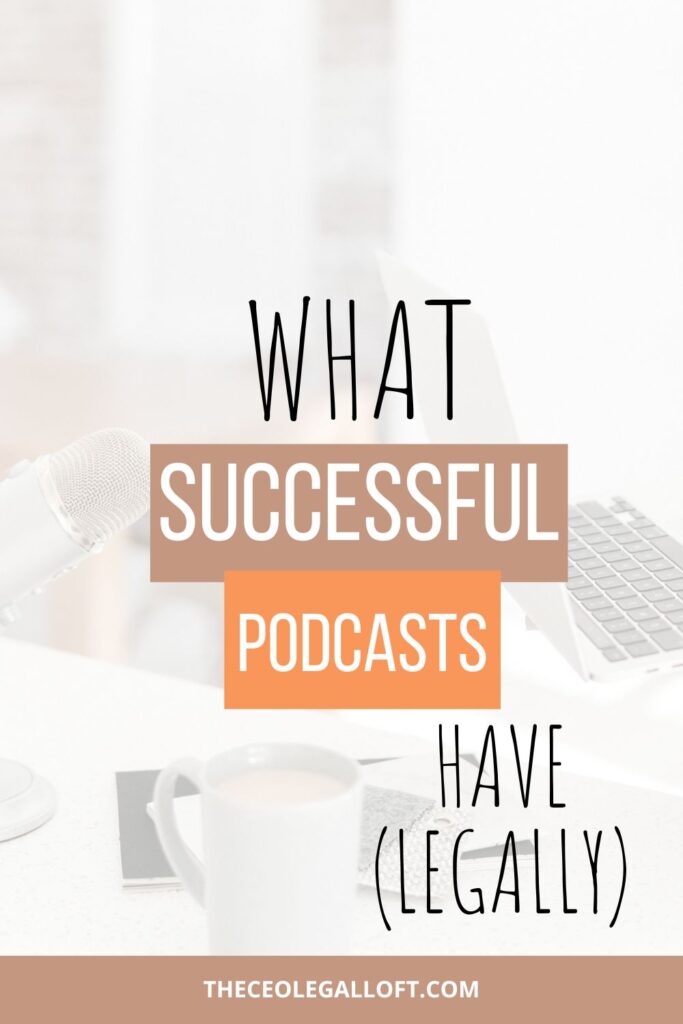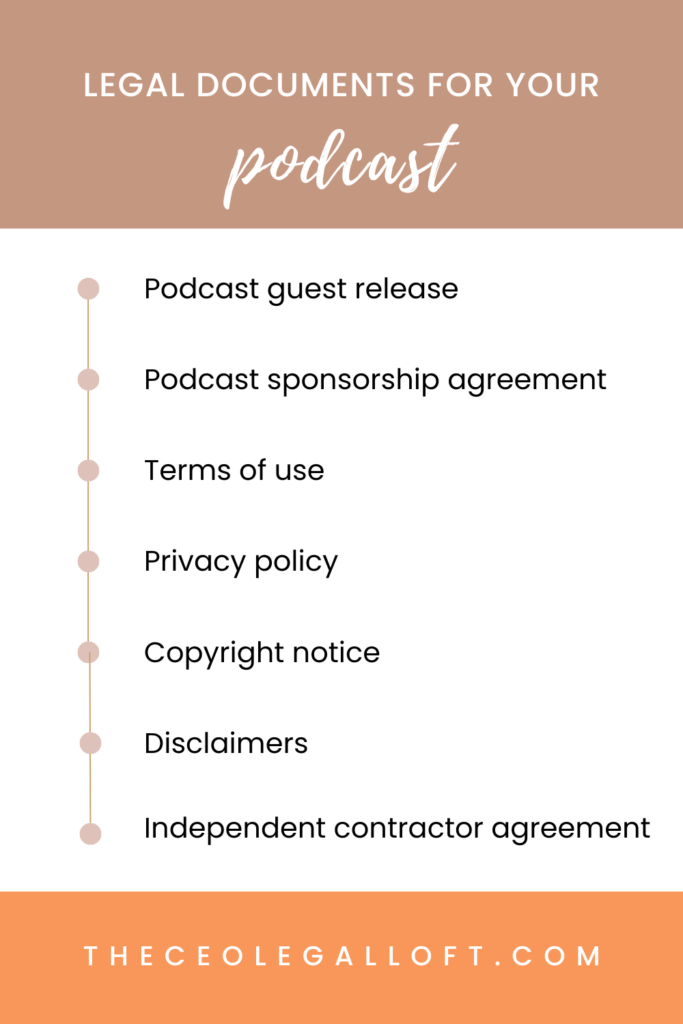Starting a podcast can be an exciting endeavor, but it’s important to make sure that you have all the necessary legal documents in order to protect yourself and your content. As your podcast gets more popular, you’ll need documents like copyright notices or podcast guest releases. Read on to find out what other legal documents you’ll need for a successful podcast.
What are the legal implications of a podcast?
Podcasts can have legal implications if they include content that is considered copyright infringement. If someone uses copyrighted material in their podcast without permission, they may be subject to fines or other legal action. It is important to check the laws in your jurisdiction before using any third-party content in a podcast to avoid potential issues.
Additionally, podcasts may also be liable for libel and slander if they contain false statements about people or businesses. It is important for podcasters to ensure that their content does not contain any potentially defamatory material as this could lead to expensive legal troubles. Finally, podcasts should also be careful when discussing private information as this can lead to privacy issues and potential lawsuits.

What legal documents do you need for a podcast?
- Podcast Guest Release
If you have guests on your podcast, you may want to have them sign a release form giving you permission to use their name, likeness, and voice on your podcast. A guest release form can help protect you from any claims of infringement or unauthorized use of a person’s name or likeness. It also ensures that you have the legal right to use the guest’s appearance and voice on your podcast. - Podcast Sponsorship Agreement
Podcast sponsorships have become a popular way for podcasters to monetize their content. Sponsorship involves promoting a product or service on your podcast in exchange for payment. Typically, sponsors will pay a set fee to the podcast host to have their product or service mentioned during an episode, or in a series of episodes.
Podcast sponsorships can be a win-win situation, as sponsors gain exposure to a targeted audience while podcasters can generate revenue to support their show. However, it’s important for podcasters to be transparent with their listeners about sponsored content, and ensure that the sponsor’s product or service is a good fit for their audience. Additionally, podcasters should be mindful of maintaining the integrity and quality of their content, and not compromise their values or authenticity for the sake of a sponsorship deal. - Terms of Use/Terms of Service
A terms of use or terms of service agreement outlines the rules and regulations for using your podcast. It covers things like content ownership, prohibited conduct, and limitations of liability. This document is important as it sets out the terms that your listeners must agree to before using your podcast. A well-drafted terms of use agreement can help protect your intellectual property, limit your liability, and provide clear guidelines for your listeners. - Privacy Policy
A privacy policy explains how you collect, use, and protect personal information from your listeners. This is especially important if you collect any personal information from your listeners, such as email addresses or other contact information. A privacy policy can help you comply with privacy laws and regulations, and demonstrate to your listeners that you take their privacy seriously. - Copyright Notice
A copyright notice informs your listeners that your podcast and its contents are protected by copyright law. This can help prevent copyright infringement and deter potential infringers. A copyright notice should include the copyright symbol (©), the year of publication, and the name of the copyright owner (e.g. © 2020-2023. Michelle W. Murphy LLC) - Applicable Disclaimers
A disclaimer is a statement to limit the legal liability of the person or organization making the statement. Some disclaimers inform your listeners that the opinions expressed on your podcast are those of the speaker and do not necessarily reflect the opinions of the podcast producer or any affiliated organizations. Other disclaimers clarify that the views expressed on your podcast are not intended to be legal, financial, or professional advice. - Independent contractor agreement
it is advisable that if you hire a podcast editor or virtual assistant on a contract basis to have an independent contractor agreement in place. An independent contractor agreement is a legal contract between a company or individual and a freelancer or independent contractor, which outlines the terms and conditions of the working relationship.
An independent contractor agreement can help protect both the podcast editor or virtual assistant and the podcaster by clarifying important details such as payment terms, deliverables, deadlines, ownership of intellectual property, and confidentiality obligations.
Having an independent contractor agreement can help avoid misunderstandings or disputes, and can provide a clear understanding of the expectations and responsibilities of both parties. It can also be an important tool in demonstrating the legitimacy of the working relationship for tax and legal purposes.

Do You Always Need a Podcast Guest Release Form?
When it comes to podcasting, it’s important to understand that you may need a podcast guest release form. This form is a written agreement between the guest and the host of the podcast, confirming that the guest has given permission for their appearance and audio content to be used in the recording. Depending on the type of content you are creating, this document can protect both parties in case of any legal issues. It also provides clarity on how much control each party has over the content and how it can be used. Therefore, it’s always recommended to have a podcast guest release form in place prior to filming or recording your podcast episode.
Can your guest change their mind and force you to remove their episode?
It’s possible for a podcast guest to change their mind and request that their appearance be removed from a podcast episode, but whether they can actually force you to remove it depends on a few factors.
Firstly, if the guest signed a release form giving you permission to use their name, likeness, and voice on your podcast, then they may not have the legal right to demand that you remove their appearance. The release form should have clearly outlined the terms of the guest’s participation in the podcast and the use of their content, which could limit the guest’s ability to revoke their consent.
However, if the guest did not sign a release form or if the form was not clear or specific enough, then they may have a stronger case for having their appearance removed. Additionally, in some jurisdictions, individuals may have certain legal rights to their image or voice that could override any release form or agreement.
In any case, it’s important to take any requests for removal seriously and handle them with sensitivity and respect. It’s also a good practice to have a plan in place for handling these types of requests, and to consult with a lawyer to ensure that your podcast is in compliance with any applicable laws and regulations.

Get a Podcast Guest Release today
I hope this guide on the legal documents for podcasts has been helpful. If you take anything away from this guide, remember that legally protecting your podcast shouldn’t be an afterthought.
The best way to start on protecting your business is by adding a podcast guest release, if you plan on having guests on your podcast. These templates are attorney drafted and have instructions on filling it out. Click here to get the podcast guest release from The CEO Legal Loft Shop.

+ show Comments
- Hide Comments
add a comment